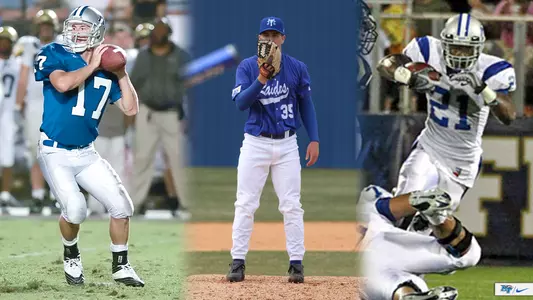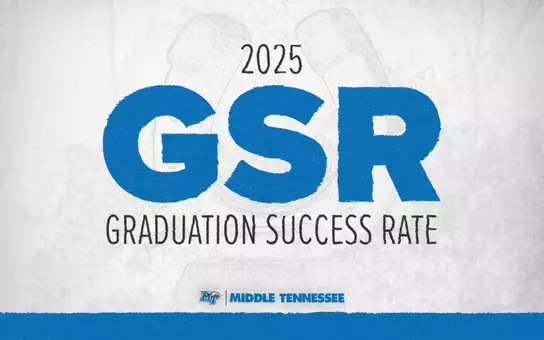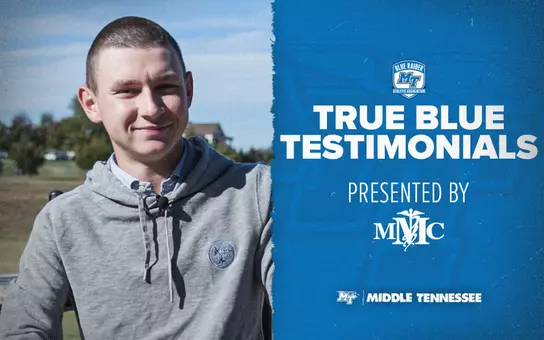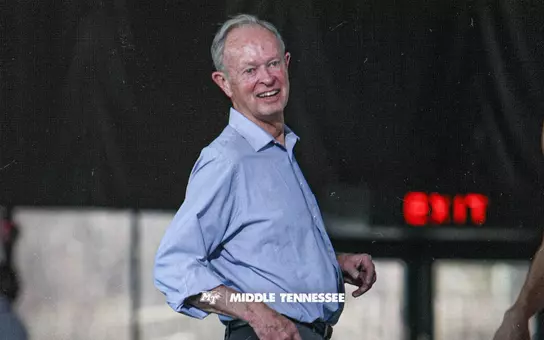Middle Tennessee State University Athletics

Former Blue Raiders share stories of triumph through sports; deliver message of hope
4/5/2020 5:00:00 PM | General
Sports. Through history, it's been one of the constants that's helped society get through tough times by giving us a reason to smile. It teaches you lessons on perseverance and builds character to get through adverse situations. It humbles you when you enjoy great success and get the chance to share that success with others.
Since its inception in 1911, Middle Tennessee State has seen numerous athletes fight through tough times. It has seen athletes enjoy both professional and even hall of fame careers who've turned around to share those lessons of perseverance with everyone they've been able to impact throughout their lives.
No matter how good or how bad things get, both on and off the field, there's always one thing that remains constant in the world of sports: hope. Hope can come in many different shapes, forms and fashions. It can result from rising from the ashes or being a beacon of hope for those that can benefit from you. For three such former athletes (football players Phillip Tanner and Wes Counts and baseball player Kenneth Roberts), they've all had things happen to them both on and off the field that've impacted their relationship with the communities in which they live and, through the games that they love, shown them that there is always hope for those who continue to battle through the challenges that both sports and life present. These are their stories.
Wes Counts
Tuesday, Sept. 11, 2001. It was a morning that Americans will never forget. For many, like former MTSU quarterback Wes Counts, it was just another typical day.
As he got ready for class, Counts flipped the TV on in his dorm room. Just as many others all over the nation had seen, the Murfreesboro native stared at a giant gash in the side of the north tower of the World Trade Center. Confused as to what was going on at first, he headed to class. As soon as the class let out, he soon learned the ugly truth of what happened.
With so much uncertainty as to what was going on that morning, football practice still remained on for that afternoon. Though it didn't seem like it at first, practice ended up becoming one of the only moments of the following day that Counts and his teammates had to get their minds off of what was happening.
"It didn't seem like it at the time, but I think football was good for us," Counts said. "The following week when we played at Louisiana-Monroe, they had the captains coming out to the field. As we were walking out, I can remember 'I'm Proud to Be an American' playing on the jumbotron. It made us realize that we were doing something a little different."
Football was different. It was something that represented a good time in the United States. It was almost exactly what the country needed. In a time when the country was recovering from one of the most devastating attacks on its soil, Counts and his MTSU teammates were a beacon of hope to the people watching them for the first time after the attacks.
Before the Blue Raiders came out of the tunnel, first responders and military were recognized on the field that afternoon in Louisiana. The game brought people together and symbolized hope in a time of need. It was the clichéd next-man-up mentality coming out in everyone as an American people. In football, when one person goes down, the next man has to step into his shoes for the good of the team.
While the events of 9-11 were very different than that of what's going on in the world today with COVID-19, the lesson that became evident to Counts and his teammates that you have to come together to overcome obstacles still holds true. When the next man comes up to face the challenge, hope is always there that you can overcome whatever is thrown at you, both on the field and off.
"(9-11 and the COVID-19 pandemic) are similar in the fact that if there's any country in the world that can get through it, it's us," Counts said. "Whether it was at a baseball game or a football game or it was just people being nice to each other back then, people helping each other is what helped get us through it. The American people have always been resilient. We always come though."
Kenneth Roberts
Former MTSU baseball player Kenneth Roberts grew up in Murfreesboro. Getting the chance to play for his hometown team was a dream of his that he got to live out. Not only did he get to live out that dream, but he was one of the program's better players in recent memory, eventually getting drafted in the 25th round by the Colorado Rockies and making it to the Majors in 2015.
As a junior at MTSU in 2009, he had arguably his best season in blue, going 11-1 with a 3.04 ERA and 62 strikeouts in 16 appearances. Though he had a lot of triumphs, he got one of the biggest scares of his life one April afternoon.
The Good Friday tornado in Middle Tennessee went through the neighborhood Roberts grew up in, doing damage to his childhood home and wiping out much of the neighborhood.
"The house next door to my parents got completely knocked down," Roberts said. "My parents' house had enough damage to where they had to move out for the summer. Windows were smashed out, fence posts were sticking into the house and the air conditioning unit was torn up. They were in the house when it happened."
During the tornado, Roberts lived on campus. When he turned on the TV and saw the tornado tearing through Murfreesboro, he immediately grabbed his phone and frantically dialed both of his parents' numbers.
As the phone rang and it continued going to voicemail, it started to set in that things may be starting to head south. After the tornado had finally cleared out and Roberts had gotten to within a half mile of his family's home, he began to realize this was going to be something that would impact the community for years to come.
But, as all of this was unfolding, the Blue Raiders were in the midst of what would eventually become the best season in school history. The following day, in fact, they were going to begin a three-game homestand against Sun Belt Conference foe Florida International. Baseball had to go on.
For Roberts, the game taught him the important lesson of perseverance and provided him with a release from the destruction.
"(Baseball) taught me to control what I can control," he said. "With everything that happened with the tornado, I knew I couldn't control any of that. Baseball also taught me how to move forward.
"It's just like when you give up a home run. You can't do anything to get that pitch back. All you can do is move forward and look at what's in front of you. That's the way I've lived my life. I try not to dwell on the past. Baseball teaches you to move on when there's hard times. What's important is that you don't let them affect tomorrow."
As the season went along, Roberts continued to balance both baseball and helping out with the recovery efforts. Sure, it wasn't always easy having to make that balance, but the game taught him and his teammates who went through the tornado one thing: there's always hope when you look toward tomorrow; effect what you can and you can do great things, just like going on to pitch for the Colorado Rockies.
Phillip Tanner
When you think back on the time Phillip Tanner spent in a Blue Raiders uniform, you can probably recall him galloping down the sidelines during the GoDaddy.com Bowl after emerging from a sea of Miami Redhawk defenders. You can probably remember him making an acrobatic catch and following his blockers into the end zone as the Floyd Stadium crowd cheered. You can probably remember him defying odds as an undrafted free agent and not only making the Dallas Cowboys' roster, but scoring a touchdown in the same game he recorded his first NFL carry in 2011 against the St. Louis Rams.
The kid from Kimball, Texas, is one of the most celebrated running backs in Blue Raiders history. In his collegiate career, Tanner amassed more than 2,000 yards and scored 33 touchdowns despite spending his entire freshman season as a defensive back and injuring his knee in his senior year.
Success didn't always come easy for Tanner, but the path to the NFL shaped him as both a player and a person. It taught him how to fight. It taught him how to always have hope and reach for the stars. It shaped him into a model that coaches look for, and that's something that caught the eye of former Cowboys teammate Jon Kitna, as Kitna recently hired Tanner as an assistant coach at Burleson High School in Texas.
"Getting to coach high school ball means everything to me," Tanner said. "I believe coaches save lives. I had a high school coach (former Kimball High School head coach Robert Taylor) that took me in and mentored me into the man I am today. To get the opportunity to get to develop young men is so much more important than 'Can you jump high, score touchdowns or make tackles?' I want to impact these kids. They don't care how much you know until they know how much you care."
At one point in time, Tanner was the same as those high school kids learning how to read a defense for the first time. He was a nervous freshman that was stepping off the bus to play football at Middle Tennessee, which was almost another world compared to where he grew up.
As he developed through those early years into what he eventually became, the biggest lesson he learned from the game was taking the time to enjoy the moment and winning the day. He learned to love the game, and now makes sure as a coach his players know he cares for them.
"Growing up, if I knew a coach cared for me, I'd run through a brick wall for him," Tanner said. "I want them to know I care about them as a person first and a player second."
Having played at Middle Tennessee, Tanner had to learn how to smash through a brick wall to make it to the NFL. Getting the guidance he needed from head coach Rick Stockstill helped Tanner develop what he calls an "alley dog," mindset.
Through his "alley dog," mindset, he knew that in order to continue to grow as a player and get on the radar of NFL coaches, he'd have to do things off the radar in order to "sneak in the back door." It wasn't easy, but through hard work and perseverance, he smashed through that brick wall.
Now, the former Blue Raider running back has a chance to pass on the lessons he learned to the next generation.
"Coach Stockstill is amazing, and I can't thank him enough for what he's done," Tanner said. "What he does for the community and the kids has no price tag that you can put on that. You can call any player that's ever played for him at Middle, and I guarantee they'll echo that same call. It's a first-class program at MTSU, and I'm glad I could be a part of it."
Anthony Fiorella is a writer for goblueraiders.com. Follow him on Twitter @a_fiorella74 and also follow @MTAthletics for more on the Blue Raiders
Since its inception in 1911, Middle Tennessee State has seen numerous athletes fight through tough times. It has seen athletes enjoy both professional and even hall of fame careers who've turned around to share those lessons of perseverance with everyone they've been able to impact throughout their lives.
No matter how good or how bad things get, both on and off the field, there's always one thing that remains constant in the world of sports: hope. Hope can come in many different shapes, forms and fashions. It can result from rising from the ashes or being a beacon of hope for those that can benefit from you. For three such former athletes (football players Phillip Tanner and Wes Counts and baseball player Kenneth Roberts), they've all had things happen to them both on and off the field that've impacted their relationship with the communities in which they live and, through the games that they love, shown them that there is always hope for those who continue to battle through the challenges that both sports and life present. These are their stories.
Wes Counts
Tuesday, Sept. 11, 2001. It was a morning that Americans will never forget. For many, like former MTSU quarterback Wes Counts, it was just another typical day.
As he got ready for class, Counts flipped the TV on in his dorm room. Just as many others all over the nation had seen, the Murfreesboro native stared at a giant gash in the side of the north tower of the World Trade Center. Confused as to what was going on at first, he headed to class. As soon as the class let out, he soon learned the ugly truth of what happened.
With so much uncertainty as to what was going on that morning, football practice still remained on for that afternoon. Though it didn't seem like it at first, practice ended up becoming one of the only moments of the following day that Counts and his teammates had to get their minds off of what was happening.
"It didn't seem like it at the time, but I think football was good for us," Counts said. "The following week when we played at Louisiana-Monroe, they had the captains coming out to the field. As we were walking out, I can remember 'I'm Proud to Be an American' playing on the jumbotron. It made us realize that we were doing something a little different."
Football was different. It was something that represented a good time in the United States. It was almost exactly what the country needed. In a time when the country was recovering from one of the most devastating attacks on its soil, Counts and his MTSU teammates were a beacon of hope to the people watching them for the first time after the attacks.
Before the Blue Raiders came out of the tunnel, first responders and military were recognized on the field that afternoon in Louisiana. The game brought people together and symbolized hope in a time of need. It was the clichéd next-man-up mentality coming out in everyone as an American people. In football, when one person goes down, the next man has to step into his shoes for the good of the team.
While the events of 9-11 were very different than that of what's going on in the world today with COVID-19, the lesson that became evident to Counts and his teammates that you have to come together to overcome obstacles still holds true. When the next man comes up to face the challenge, hope is always there that you can overcome whatever is thrown at you, both on the field and off.
"(9-11 and the COVID-19 pandemic) are similar in the fact that if there's any country in the world that can get through it, it's us," Counts said. "Whether it was at a baseball game or a football game or it was just people being nice to each other back then, people helping each other is what helped get us through it. The American people have always been resilient. We always come though."
Kenneth Roberts
Former MTSU baseball player Kenneth Roberts grew up in Murfreesboro. Getting the chance to play for his hometown team was a dream of his that he got to live out. Not only did he get to live out that dream, but he was one of the program's better players in recent memory, eventually getting drafted in the 25th round by the Colorado Rockies and making it to the Majors in 2015.
As a junior at MTSU in 2009, he had arguably his best season in blue, going 11-1 with a 3.04 ERA and 62 strikeouts in 16 appearances. Though he had a lot of triumphs, he got one of the biggest scares of his life one April afternoon.
The Good Friday tornado in Middle Tennessee went through the neighborhood Roberts grew up in, doing damage to his childhood home and wiping out much of the neighborhood.
"The house next door to my parents got completely knocked down," Roberts said. "My parents' house had enough damage to where they had to move out for the summer. Windows were smashed out, fence posts were sticking into the house and the air conditioning unit was torn up. They were in the house when it happened."
During the tornado, Roberts lived on campus. When he turned on the TV and saw the tornado tearing through Murfreesboro, he immediately grabbed his phone and frantically dialed both of his parents' numbers.
As the phone rang and it continued going to voicemail, it started to set in that things may be starting to head south. After the tornado had finally cleared out and Roberts had gotten to within a half mile of his family's home, he began to realize this was going to be something that would impact the community for years to come.
But, as all of this was unfolding, the Blue Raiders were in the midst of what would eventually become the best season in school history. The following day, in fact, they were going to begin a three-game homestand against Sun Belt Conference foe Florida International. Baseball had to go on.
For Roberts, the game taught him the important lesson of perseverance and provided him with a release from the destruction.
"(Baseball) taught me to control what I can control," he said. "With everything that happened with the tornado, I knew I couldn't control any of that. Baseball also taught me how to move forward.
"It's just like when you give up a home run. You can't do anything to get that pitch back. All you can do is move forward and look at what's in front of you. That's the way I've lived my life. I try not to dwell on the past. Baseball teaches you to move on when there's hard times. What's important is that you don't let them affect tomorrow."
As the season went along, Roberts continued to balance both baseball and helping out with the recovery efforts. Sure, it wasn't always easy having to make that balance, but the game taught him and his teammates who went through the tornado one thing: there's always hope when you look toward tomorrow; effect what you can and you can do great things, just like going on to pitch for the Colorado Rockies.
Phillip Tanner
When you think back on the time Phillip Tanner spent in a Blue Raiders uniform, you can probably recall him galloping down the sidelines during the GoDaddy.com Bowl after emerging from a sea of Miami Redhawk defenders. You can probably remember him making an acrobatic catch and following his blockers into the end zone as the Floyd Stadium crowd cheered. You can probably remember him defying odds as an undrafted free agent and not only making the Dallas Cowboys' roster, but scoring a touchdown in the same game he recorded his first NFL carry in 2011 against the St. Louis Rams.
The kid from Kimball, Texas, is one of the most celebrated running backs in Blue Raiders history. In his collegiate career, Tanner amassed more than 2,000 yards and scored 33 touchdowns despite spending his entire freshman season as a defensive back and injuring his knee in his senior year.
Success didn't always come easy for Tanner, but the path to the NFL shaped him as both a player and a person. It taught him how to fight. It taught him how to always have hope and reach for the stars. It shaped him into a model that coaches look for, and that's something that caught the eye of former Cowboys teammate Jon Kitna, as Kitna recently hired Tanner as an assistant coach at Burleson High School in Texas.
"Getting to coach high school ball means everything to me," Tanner said. "I believe coaches save lives. I had a high school coach (former Kimball High School head coach Robert Taylor) that took me in and mentored me into the man I am today. To get the opportunity to get to develop young men is so much more important than 'Can you jump high, score touchdowns or make tackles?' I want to impact these kids. They don't care how much you know until they know how much you care."
At one point in time, Tanner was the same as those high school kids learning how to read a defense for the first time. He was a nervous freshman that was stepping off the bus to play football at Middle Tennessee, which was almost another world compared to where he grew up.
As he developed through those early years into what he eventually became, the biggest lesson he learned from the game was taking the time to enjoy the moment and winning the day. He learned to love the game, and now makes sure as a coach his players know he cares for them.
"Growing up, if I knew a coach cared for me, I'd run through a brick wall for him," Tanner said. "I want them to know I care about them as a person first and a player second."
Having played at Middle Tennessee, Tanner had to learn how to smash through a brick wall to make it to the NFL. Getting the guidance he needed from head coach Rick Stockstill helped Tanner develop what he calls an "alley dog," mindset.
Through his "alley dog," mindset, he knew that in order to continue to grow as a player and get on the radar of NFL coaches, he'd have to do things off the radar in order to "sneak in the back door." It wasn't easy, but through hard work and perseverance, he smashed through that brick wall.
Now, the former Blue Raider running back has a chance to pass on the lessons he learned to the next generation.
"Coach Stockstill is amazing, and I can't thank him enough for what he's done," Tanner said. "What he does for the community and the kids has no price tag that you can put on that. You can call any player that's ever played for him at Middle, and I guarantee they'll echo that same call. It's a first-class program at MTSU, and I'm glad I could be a part of it."
Anthony Fiorella is a writer for goblueraiders.com. Follow him on Twitter @a_fiorella74 and also follow @MTAthletics for more on the Blue Raiders
MTSU Men's Basketball Press Conference 12/21/25MTSU Men's Basketball Press Conference 12/21/25
Sunday, December 21
MTSU Men's Basketball Post Game Press Conference vs Kennesaw State 12/17/25MTSU Men's Basketball Post Game Press Conference vs Kennesaw State 12/17/25
Thursday, December 18
MTSU Women's Basketball vs. Auburn Postgame Press Conference on 12/16/25MTSU Women's Basketball vs. Auburn Postgame Press Conference on 12/16/25
Wednesday, December 17
MT Women's Basketball | Together: Episode Three | It's gotta mean something to youMT Women's Basketball | Together: Episode Three | It's gotta mean something to you
Tuesday, December 16


















